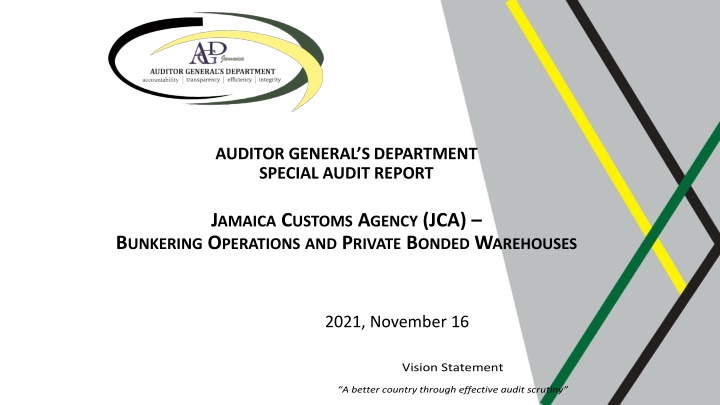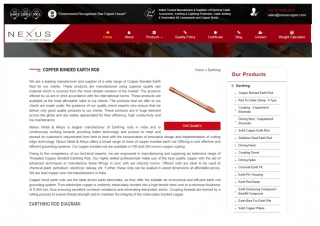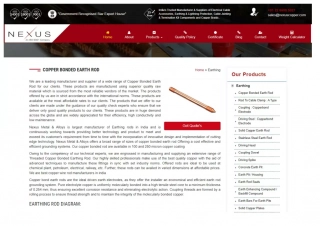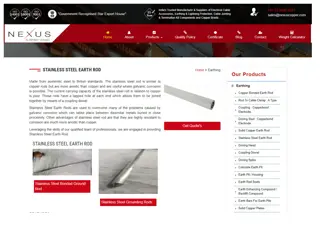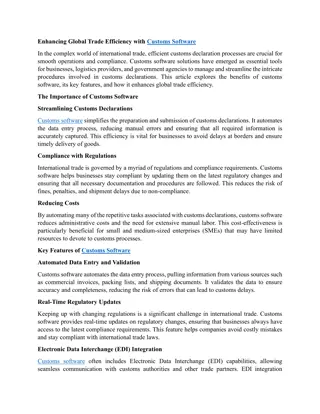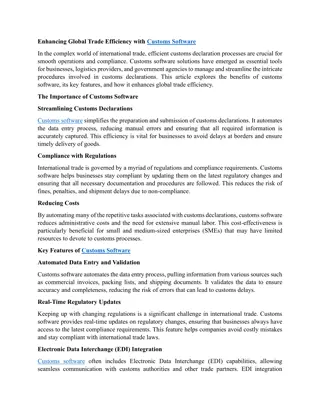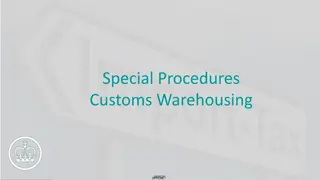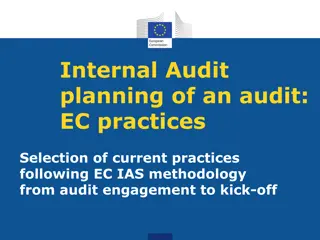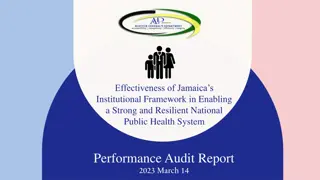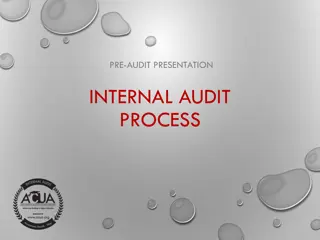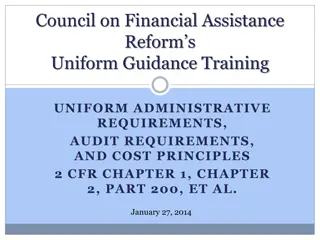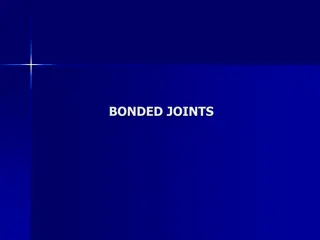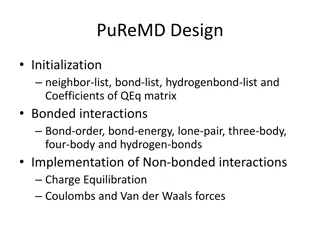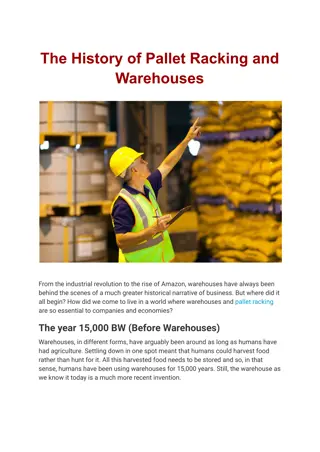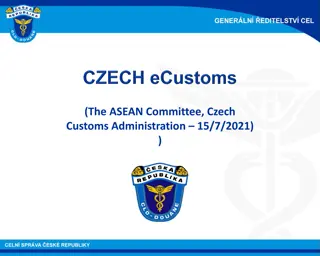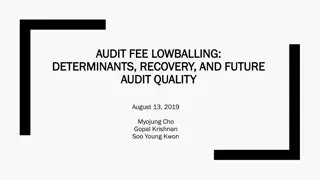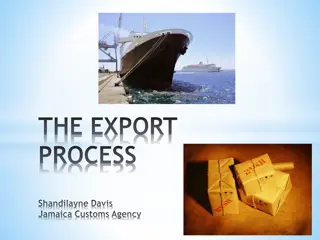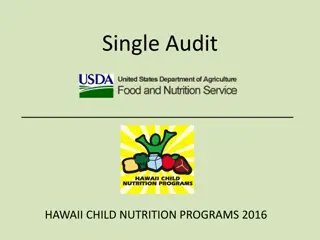Special Audit Report on Jamaica Customs Agency: Bunkering Operations and Private Bonded Warehouses
The Auditor General's Department conducted a special audit to investigate allegations of malpractice and deficiencies in operations within private bonded warehouses at Jamaica Customs Agency (JCA). The audit aimed to assess the credibility of these claims and determine the effectiveness of internal controls at JCA from 2016 to 2021. JCA's mandate includes collecting customs duties, interdicting contraband, and protecting Jamaica's industries, labor, and intellectual property rights. The report provides insights into customs operations, facilities definitions, and assessing and collecting duties to enhance transparency and accountability.
Download Presentation

Please find below an Image/Link to download the presentation.
The content on the website is provided AS IS for your information and personal use only. It may not be sold, licensed, or shared on other websites without obtaining consent from the author.If you encounter any issues during the download, it is possible that the publisher has removed the file from their server.
You are allowed to download the files provided on this website for personal or commercial use, subject to the condition that they are used lawfully. All files are the property of their respective owners.
The content on the website is provided AS IS for your information and personal use only. It may not be sold, licensed, or shared on other websites without obtaining consent from the author.
E N D
Presentation Transcript
AUDITOR GENERALS DEPARTMENT SPECIAL AUDIT REPORT JAMAICA CUSTOMS AGENCY (JCA) BUNKERING OPERATIONS AND PRIVATE BONDED WAREHOUSES 2021, November 16 Vision Statement A better country through effective audit scrutiny
Audit Rationale and Scope Also to ascertain the credibility of the allegations regarding malpractice and deficiencies in the operations of private bonded warehouses. Determine whether JCA had in place, internal controls including policies and procedures to guide its activities, and reduce the risk of financial losses and corrupt practices. The audit covered the period 2016 to 2021.
Background Mandate Powers JCA is responsible for collecting all customs duties and related charges for goods being imported, as well as the relevant fees related to all exports. The powers of the JCA are vested in the Commissioner in exercising his/her duties Customs Officers have similar powers, authorities, and privileges as are given by law to the officers of the Constabulary Force JCA was designated as an executive agency based on the provisions of the Executive Agencies Act on March 28, 2013, to take effect from April 2, 2013
Facilities Definitions Facilities Definitions Private Bonded Warehouse Special Economic Zone (SEZ) Sufferance Wharf This is a secured area approved and monitored by the JCA in which dutiable goods may be stored, manipulated, or undergo manufacturing operations without payment of duty. This is any place designated by the Minister at which imported goods or goods about to be exported may be loaded or unloaded. This a geographical area designated by the Minister and published in the Gazette. Companies operating in the Zone are treated, as operating outside of the Customs Area.
Assessing and collecting Assessing and collecting customs duties, fees, and penalties due on imports and exports; Interdicting and seizing contraband, including narcotics and illegal drugs; Interdicting and seizing Jamaica Customs Agency's Mandate Processing Processing passengers, baggage, cargo and mail; Detecting and apprehending persons engaged in fraudulent practices designed to circumvent Customs related laws; Detecting & apprehending Protecting Jamaica's industries, labour and intellectual property rights by enforcing Jamaica's laws intended to prevent illegal trade practices. Protecting Protecting the general welfare and security of Jamaica by enforcing import and export restrictions and prohibitions, including money laundering. Protecting
Key Findings Key Findings
Key Findings Areas of Control Weakness JCA failed to authenticate that exports from BFO1 were valid, as it did not ensure that the previous entry placing the fuel in the zone and the corresponding export entry for ship sales or import entry, were recorded on the entry (Box 40). JCA was unable to provide evidence to readily substantiate whether fuel under the IM9 regime was exported or sold on the local market. Sales of 275.6MN litres of fuel with a customs value of $12.19BN by Petrojam to BFO1, its subsidiary and bauxite companies were classified as exports. Local Sales classified as exports Lack of Authentication Inconsistent Monitoring JCA did not undertake consistent monitoring of the import and export activities of BFO1 and hence could not readily provide evidence that it tracked all fuel placed in and removed from the SEZ to ensure that BFO1 paid all required duties. JCA was unable to provide assurance that it verified how the ULSD imported in January 2019 was disposed of in January 2021 and February 2021, given subsequent importation and sales of ULSD using the same ULSD tank. Between June 2018 and February 2020, BFO1 failed to declare in a timely manner, a total of 50.08MN litres of imported fuel on five shipments with a CIF value of $1.892BN and estimated duties of $2.1BN.
Key Findings Areas of Control Weakness JCA failed to validate the authenticity of 765 entry declarations related to 296.34MN litres of fuel with a custom value of approximately $12BN for BFO1 that were paid late and recorded as exports. Only CARICOM invoices were uploaded by BFO1 importer; hence we were unable to verify that the entries represented legitimate imports. No evidence of independent verification by a surveyor, of the type and volume of fuel being transacted by BFO1.
Applications from Petrojam for provisional clearance of goods (C88) for fuel imported from 2016 to 2019 approved up to a month after the vessels departed the port from which the fuel was offloaded Key Findings Financial Exposure 30 import entry declarations and the associated export entry declaration of bunkering fuel for the period 2016 to 2018 revealed discrepancies with HFO, ULSD and Marine Diesel Oil (MDO) imports. JCA s database revealed 225 items relating to 144 export entries for bunker fuel that were entered into the ASYCUDA database up to one year after the vessel to which the fuel was exported departed from the port. Three importers who operated private bonded warehouses owed an estimated $664.24MN after bond drawdowns and recoveries in relation to the warehouse operations as at September 30, 2021
Key Findings Non Transactional Issues Final Entries submitted after Moratorium period Security bond Check turned off 355 occasions between October 2015 and September 2, 2020, the surety checking feature of ASYCUDA was turned off for 94 (85%) of the private bonded warehouse operators; of these, 16 operators had the checking feature tuned off for over a year. On 48 occasions, final import entries and applicable duties and fees paid by Petrojam after the specified moratorium period of 21 days or six weeks.
Recommendations Recommendations Evaluate the reporting capabilities of ASYCUDA in line with current practices and devise measures to ensure the Agency strengthens its monitoring and control activities. over the activities of the importers and custom brokers to effectively secure the GOJ s revenue Policies & Procedures Policy & Procedures Establish detailed procedures to independently and routinely record all movements of bunker fuel imported, sold, or exported; to ensure relevant duties and fees are paid immediately when they become due.
Recommendations Recommendations Employ strict enforcement of the Customs Act and JCA s procedures; take immediate steps to collect all outstanding duties and fees. Establish a comprehensive reporting protocol for handling errors and irregular activities for timely resolutions so that all duties and fees due to GOJ are paid without delay.; urgently correct specific errors identified in the ASYCUDA system. Monitoring & Enforcement Monitoring & Enforcement Further strengthening of JCA s monitoring and oversight systems is necessary to enhance its effectiveness in protecting Jamaica s borders against illicit imports while ensuring the equitable collection of revenue, in accordance with its mandate.
